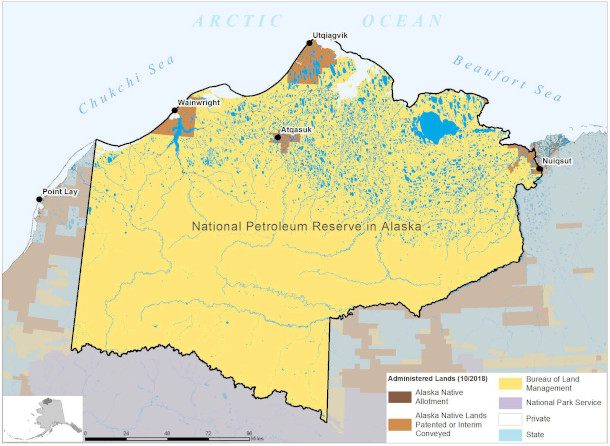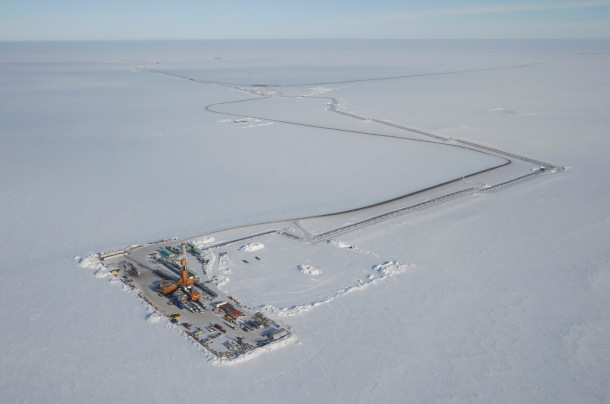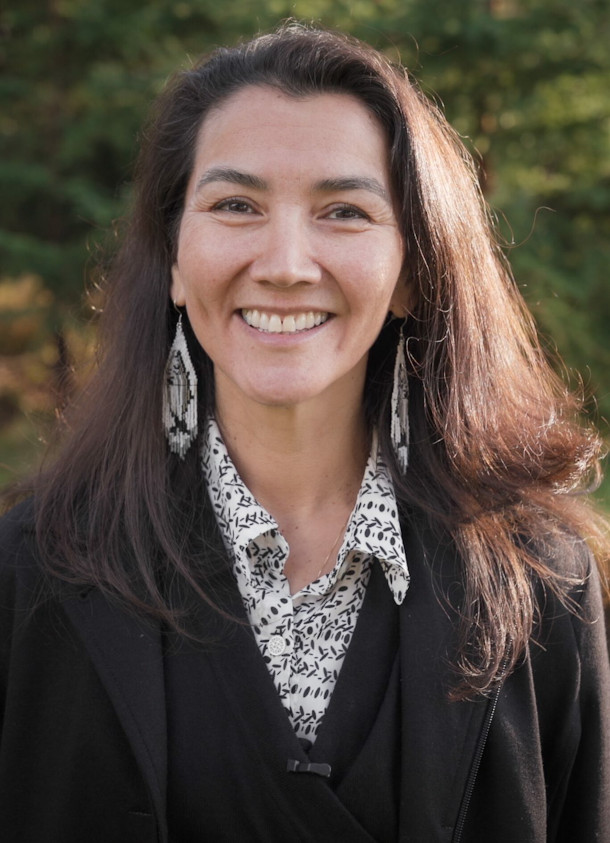Broken Promise for the Arctic
Air Date: Week of March 17, 2023

The community and people of Anaktuvuk Pass, the Nunamiut people, have expressed their concern that the Willow oil project will threaten their traditional caribou hunting and trading grounds by reducing the caribou population. Pictured above is Teshekpuk Caribou in the Northeast National Petroleum Reserve in Alaska. (Photo: Bob Wick, Bureau of Land Management, Flickr, CC BY 2.0)
A massive new oil drilling project in the Arctic just got the green light from President Biden despite his promises for no new drilling on federal lands. Environmental law expert Pat Parenteau joins Host Steve Curwood to explain the climate contradictions within the White House and what could happen next.
Transcript
CURWOOD: From PRX and the Jennifer and Ted Stanley Studios at the University of Massachusetts Boston, this is Living on Earth. I’m Steve Curwood.
Despite campaign promises to halt the extraction of fossil fuels from public lands, President Biden has approved the massive Willow Oil Project of ConocoPhillips on the North Slope of Alaska. It’s the largest planned drilling project in the US and could produce more than 180,000 barrels of oil a day. And if all that oil is burned it would release roughly 260 million tons of carbon dioxide a year, the same as putting 2 million more gasoline powered cars on the road. Activists call it a carbon bomb that would fan the flames of global warming and cost the public billions of dollars in climate related damages. When the question of drilling in the Arctic came up during the 2020 presidential campaign Mr. Biden was unequivocal.
BIDEN: Totally opposed to it, completely, totally opposed.
CURWOOD: Again and again, he made the same pledge.
BIDEN: No more drilling on federal lands. [APPLAUSE] period, period, period, period. The Arctic Circle is a disaster to do that. A big disaster in my view.
CURWOOD: But once in office the Biden Administration defended in federal court permits issued by the Trump Administration and ultimately gave Conoco Phillips the green light to proceed. Activists including Earthjustice and the Trustees for Alaska immediately filed lawsuits saying the Willow project would violate environmental protection laws by harming nearby residents as well as the pristine North Slope ecosystem, and literally pour more gasoline on the climate crisis. More than a million people signed petitions calling for President Biden to keep his word and block the project. Politicians on both side have spoken out, including progressive Democratic New York Congressman Jamaal Bowman.
BOWMAN: We are living in a climate catastrophe. We have one human race, we have one planet, and we have people organizing across the country to make sure that Willow project doesn't happen.
CURWOOD: But with the promise of jobs and billions of dollars in state revenues the project has support from some Alaskan labor unions and lawmakers including Republican Senator Dan Sullivan.
SULLIVAN: if you can't drill in the National Petroleum Reserve of Alaska, on a project that has the highest environmental standards in the world, lowest greenhouse gas emissions in the world. What project are you ever going to approve?
CURWOOD: For more, I’m joined now by Pat Parenteau, a former EPA regional counsel and emeritus professor at Vermont Law School. Welcome back to Living on Earth, Pat!
PARENTEAU: Thanks, Steve, good to be with you.

The National Petroleum Reserve in Alaska. (Photo: Bureau of Land Management, Public Domain)
CURWOOD: So I mean, what's the argument from the administration and move forward with what some call a carbon bomb, which seems to be in direct contradiction from the President's campaign promises?
PARENTEAU: Yeah. Well, here are the reasons given by the White House so far: One, they say we're locked in by the fact that leases have been issued. Conoco has legal rights to drill, which would expose the Biden administration to litigation and perhaps result in a requirement to compensate the companies if they were to cancel the leases. Secondly, you've got a real split in the native Inuit community in Alaska. The majority of the native corporations support the project because of course it's Alaska, oil and gas is a major source of revenue for everybody. Everybody in Alaska gets a check every year based on the amount of oil and gas that's developed. But the Nuiqsut community which is right next to the oil development, and is already living with existing oil and gas operations, is the most impacted native community and they of course, are 100% against further development of oil and gas. They've already experienced gas leaks from Conoco's existing pipeline within the last year, this happened, cause the village to evacuate. You know, the Biden administration is pointing to bipartisan support for the project because both Senators Murkowski and Sullivan support it both the senators are Republican, but the new house member Peltola is a Democrat and is in fact a Native woman and also supports it. But you know, the Biden administration is working at cross purposes. It's trying to electrify the transportation system with all deliberate speed, at the same time, awarding leases that are supposed to last for 30 years based on combustion engines. So it doesn't really make a lot of sense to pursue diametrically opposed policies. And of course, it doesn't make sense rationally. It apparently makes sense to the Biden administration politically.

A drill site owned by ConocoPhillips in Alaska’s Western north slope. ConocoPhillips has major ownership interests in two of North America's largest oil fields, both located on Alaska's North Slope—Kuparuk, which the company operates, and Prudhoe Bay. (Photo: Courtesy of ConocoPhillips)
CURWOOD: ConocoPhillips got these leases for this area, I think originally back in like 1999, and of course, they have rights under the law to proceed to do their business there. What would it cost the Biden administration and the federal government if Biden says, well despite the fact that you're entitled to this, we're saying no. What will be the penalty?
PARENTEAU: Yeah, so that gets down to a question of compensation for basically breaching the contract. Leases, you can think of them as a contract and they are binding in that sense, they're legally enforceable contracts but, you know, you can breach a contract, you pay damages when you do so. And then the question is, how do you calculate the damage here? Certainly, whatever they paid for the bids would be returned. Plus, any I would say out of pocket expenses they've incurred. Now they haven't been allowed, they've done some exploration, so those costs could be recovered, but they haven't really done any, you know, significant investment in the infrastructure that they need. And I suppose the companies would argue we would also be entitled to lost profits, that's going to be more complicated. That would be the subject of litigation or settlement through negotiation so that number is harder to pin down. But the point is this, the amount of money it would take to compensate Conoco for canceling the leases, could also be looked at as basically an investment in reducing climate change impacts and an investment in protecting this at risk community and an investment in protecting one of the last really pristine areas of America with some of the original wildlife heritage of the nation, right. So whatever it would cost to compensate Conoco, you could argue is well worth it.
CURWOOD: So what's the court situation like there, I guess the chief judge of the federal district court in Alaska, Sharon Gleason ruled against the administration, said that they hadn't done the original environmental impact statement correctly and called for another one. How receptive do you think that court would be to seeing some fresh litigation along these lines? Sometimes courts get irritated and say, why are we going to have this thing you've already settled this.
PARENTEAU: Yeah, it is more difficult when you go back for what we call a second bite at the apple. But, you know, we should have known, I guess, where the Biden administration was going because they defended the Trump administration's EIS in court and they lost. So we'll have to wait and see what kinds of specific flaws that those that are going to challenge the approval of this lease, can identify. But having litigated these kinds of cases over the years, I'm fairly confident they're going to find significant problems with a project of this scale. And since Judge Gleason has at least shown an indication to look hard at whether the administration has fully complied, there's a decent chance that if they identify a significant flaw in the Biden administration's analysis, that she would, and this would be for the second time, send it back for review, not something I would count on. But I wouldn't rule out the possibility that there could be a ruling that would delay this project even further.

Lisa Murkowski is a Republican US Senator from Alaska and has been a strong supporter for oil expansion in the state. (Photo: US Senate, Public Domain)
CURWOOD: Now, the Biden administration, the same time it announced that they were approving this said, oh, we're going to have increased protection in the Arctic Ocean against petroleum extraction. How permanent are those protections? In other words, what are the chances that those protections can get thrown under the bus by another administration?
PARENTEAU: Yeah, so the White House called it a firewall. And that's probably an appropriate term, which means that what they're doing is expanding areas of the Beaufort Sea and the Chuckchi Sea from any further oil and gas development. President Obama created these so called safe zones or marine sanctuaries and so Biden is now basically expanding on those, and that's a good thing but it's not permanent, another administration can come in and make a different decision. The term firewall means it would be more difficult for a future administration to reverse course and that's true, they'd have to have some justification for that but it's not to say they couldn't do that. The other thing is, it's pretty clear that the oil industry is not really interested in further development of the Arctic Ocean. The banks are not interested in funding that, the Shell company sank something like $4 billion into an earlier attempt to get into the Arctic, they had one of their icebreaker ships actually frozen in the ice, it couldn't get through the ice. So, you know, it's good that Biden has said, no more drilling in the Arctic Ocean, but that wasn't probably going to happen anyway. A more significant concession, I think, is that the President has now also ruled out any further development of the North Slope Area, the National Petroleum Reserve area, that is significant. Again, it isn't permanent in the sense that it could never be undone but it was a good thing. It doesn't really offset, frankly, the harm that's caused by the Willow Project. And by the way, you know, this is not one like some of the others where courts have ordered the administration to issue leases, nor has Congress, by the way. So neither Congress nor the courts are ordering Biden to do this. He's making this decision on his own and he's just gonna have to own it.
CURWOOD: What does this decision do to the reputation of the United States in the international community that we are pushing to deal with climate disruption?

Mary Sattler Peltola is an American politician and former tribal judge serving as the U.S. representative from Alaska's at-large congressional district and a supporter of the Willow Project. (Photo: House of Representatives, Public Domain)
PARENTEAU: I think this sacrifices the United States credibility, look, we've already lost as a result of Trump's pulling us out of the Paris agreement, we lost a lot of credibility and when Biden agreed for us to re enter the Paris Agreement, a lot of the European nations and certainly a lot of the developing nations, China, India included, were very skeptical. Skeptical about the United States commitment to you know, climate solutions and to reforming its own carbon intensive economy. Remember, we per capita are the highest emitters of carbon in the world. So now we come along, having just you know, come back from a COP meeting in Sharm el Sheikh, trying to stimulate higher ambitions from other countries of the world, trying to convince countries like the Congo and Nigeria that have extensive oil and gas reserves, not to extract those and burn those reserves, but rather to transition to a more sustainable economy, now we come back and approved the largest oil and gas project and a very long time. And I don't know how we with a straight face, go to the next COP meeting and start pointing fingers at other nations to do better when we can't seem to model the behavior that we want to see from others.
CURWOOD: Some younger people are saying this decision by Biden is evidence that the fix is in. That despite promises of action certain powers that be are controlling things and part of that includes the fossil fuel industry. Your reading of this?
PARENTEAU: Yeah, I mean, the young generation, Gen Z's, really came out strong in social media against this project. They targeted this project as a test case for Biden's commitment to climate action, right, and the promises he made to stop drilling, and stop invading our most precious natural resources for the sake of the fossil fuel industry. And the fact that he has slapped them in the face with this decision, there's no other way to put it, I think there's going to be a consequence to that. They're not going to go vote for a Republican, they just might not vote at all. I mean, the last election, there was a record turnout of young voters and that's what propelled Biden to the White House. I'm sure he knows this and his, his staff knows this, but for some reason, they decided to not prioritize, I guess you'd say the youth vote on this one. And I don't know how they're going to restore confidence and gain back the active support, which they desperately need, if they're going to make another successful run for the White House. Time will tell, but this is a big blow I think to Biden's credibility with the younger generation.
CURWOOD: Pat Parenteau is a former regional counsel for the Environmental Protection Agency and emeritus professor of law at the Vermont Law School. Pat, always a pleasure to have you on the show.
PARENTEAU: Thanks very much Steve, enjoyed it.
Links
Scientific American | “Environmental and Indigenous Groups Sue over Willow Oil-Drilling Project”
Read the lawsuit filed by Earthjustice against President Biden’s approval of the Willow Project
Living on Earth wants to hear from you!
Living on Earth
62 Calef Highway, Suite 212
Lee, NH 03861
Telephone: 617-287-4121
E-mail: comments@loe.org
Newsletter [Click here]
Donate to Living on Earth!
Living on Earth is an independent media program and relies entirely on contributions from listeners and institutions supporting public service. Please donate now to preserve an independent environmental voice.
NewsletterLiving on Earth offers a weekly delivery of the show's rundown to your mailbox. Sign up for our newsletter today!
 Sailors For The Sea: Be the change you want to sea.
Sailors For The Sea: Be the change you want to sea.
 The Grantham Foundation for the Protection of the Environment: Committed to protecting and improving the health of the global environment.
The Grantham Foundation for the Protection of the Environment: Committed to protecting and improving the health of the global environment.
 Contribute to Living on Earth and receive, as our gift to you, an archival print of one of Mark Seth Lender's extraordinary wildlife photographs. Follow the link to see Mark's current collection of photographs.
Contribute to Living on Earth and receive, as our gift to you, an archival print of one of Mark Seth Lender's extraordinary wildlife photographs. Follow the link to see Mark's current collection of photographs.
 Buy a signed copy of Mark Seth Lender's book Smeagull the Seagull & support Living on Earth
Buy a signed copy of Mark Seth Lender's book Smeagull the Seagull & support Living on Earth

